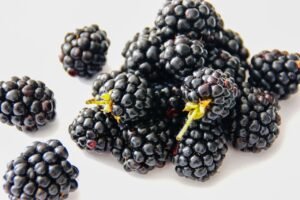Welcome to our latest blog post on the delicious and nutritious fruit, boysenberries! If you haven’t tried this juicy and flavorful berry yet, you’re in for a treat. Not only are boysenberries packed with essential vitamins and minerals, but they also have numerous health benefits and versatile uses. In this post, we’ll dive into the nutrition profile of boysenberries, explore their potential health benefits, and discuss any potential side effects. So, let’s get started and discover why boysenberries should definitely be on your list of must-try fruits.
What are Boysenberries?
Boysenberries are a hybrid fruit, a cross between raspberries, blackberries, and loganberries. They are large, dark purple to reddish in color, and have a sweet-tart flavor. Boysenberries are rich in nutrients, including vitamins, antioxidants, and fiber, making them beneficial for heart health, immune support, and digestion. They are commonly used in jams, jellies, pies, smoothies, and as fresh fruit in salads or desserts.
The Origin of Boysenberries
Boysenberries are a hybrid berry, a cross between raspberries, blackberries, and loganberries. They were first developed in the 1920s by Rudolph Boysen in California, USA. Walter Knott, of Knott’s Berry Farm fame, later popularized the fruit, making it a staple in jams, jellies, and baked goods.
10 Amazing Health Benefits of Boysenberries
Hey there, health enthusiasts! Today we are going to talk about a delicious and healthy fruit that you may or may not have heard of before – boysenberries! These small but mighty berries are packed with nutrients and offer numerous health benefits. Let’s dive into the top 10 amazing health benefits of boysenberries.
1. Rich in Antioxidants
Boysenberries are packed with antioxidants, which help protect our bodies against damage caused by free radicals. These antioxidants can help prevent chronic diseases, such as cancer and heart disease, and keep our cells healthy.
2. Boosts Immune System
Boysenberries are a great source of Vitamin C, which helps boost our immune system and protect our bodies from diseases and infections. A single cup of boysenberries provides almost 20% of our daily recommended intake of Vitamin C.
3. Good for Digestion
Boysenberries are high in fiber, which promotes healthy digestion and prevents constipation. Eating a diet rich in fiber can also lower our risk of developing certain digestive disorders, such as diverticulitis and acid reflux.
4. May Prevent Heart Disease
Studies have shown that the polyphenols found in boysenberries can help protect against heart disease by reducing inflammation and improving blood flow. These berries are also low in sodium and high in potassium, making them a heart-healthy choice.
5. Great for Eye Health
Boysenberries are rich in Vitamin A, which is essential for maintaining good eyesight and preventing age-related vision problems, such as cataracts and macular degeneration.
6. Low in Calories
For those watching their weight, boysenberries are a great option. They are low in calories and high in fiber, making us feel full and satisfied without consuming too many calories.
7. May Aid in Cancer Prevention
The high antioxidant content in boysenberries may also help prevent cancer. These antioxidants can help protect our cells from the damage caused by free radicals, which can lead to cancer development.
8. Reduces Inflammation
Inflammation is the root of many chronic diseases, and boysenberries can help fight it. These berries are rich in polyphenols and flavonoids, which have anti-inflammatory properties and can help reduce inflammation in the body.
9. Supports Healthy Skin
The Vitamin C and antioxidants found in boysenberries can also help promote healthy and glowing skin. These nutrients help protect against skin damage caused by UV rays and environmental pollutants.
10. Boosts Brain Function
Lastly, boysenberries may also improve brain function and protect against age-related cognitive decline. The polyphenols found in these berries can help improve memory and focus.
So, there you have it – 10 amazing health benefits of boysenberries. These delicious and versatile berries should definitely be a part of your diet to reap all the health benefits they have to offer. So go ahead and add them to your smoothies, salads, oatmeal, or simply enjoy them as a snack. Your body and taste buds will thank you!
The Versatile Uses of Boysenberries: A Delicious and Nutritious Addition to Your Diet
Boysenberries are not only a delight to your taste buds but also a powerhouse of nutrition. Whether you’re a health-conscious individual or simply someone who loves exploring new flavors, boysenberries can easily find their way into your daily routine. In this blog, we’ll explore the various uses of boysenberries, from culinary creations to health benefits, and how you can make the most of this amazing fruit.
1. Fresh and Juicy: A Perfect Snack
One of the simplest and most enjoyable ways to use boysenberries is to eat them fresh. Their vibrant, dark purple hue and juicy texture make them a perfect snack, especially when you need something refreshing and healthy. Packed with antioxidants, vitamins, and fiber, fresh boysenberries are a great choice for a mid-day snack or a nutritious addition to your breakfast.
2. Smoothies and Juices
Boysenberries make for a fantastic base in smoothies and juices. Their sweet-tart flavor blends seamlessly with other fruits like bananas, strawberries, and oranges. Simply toss a handful of fresh boysenberries into a blender with your favorite fruits and a splash of juice or yogurt, and you’ve got a deliciously healthy drink to kickstart your day or refresh you in the afternoon. The antioxidants in boysenberries are also great for boosting your immune system.
3. Baked Goods and Desserts
Boysenberries can transform your baking projects into something special. Whether you’re making pies, muffins, cakes, or cobblers, boysenberries add a burst of flavor and natural sweetness. Their high pectin content also makes them ideal for making homemade jams and jellies. Not only do they bring a fresh, fruity taste to your baked goods, but they also provide a nutritional boost, adding fiber and essential vitamins to your treats.
4. Salads and Dressings
For a refreshing twist, try adding boysenberries to your salads. They pair wonderfully with leafy greens, nuts, cheese, and even grilled chicken. Their sweet and tangy flavor complements savory ingredients, creating a delightful contrast. You can also incorporate boysenberries into your salad dressings by blending them with olive oil, vinegar, and a touch of honey. This adds a fruity zing to your salads, making them more exciting and flavorful.
5. Topping for Yogurt or Cereal
If you’re looking for a way to enhance your breakfast routine, boysenberries make a great topping for yogurt or cereal. The sweet and slightly tart flavor of the berries adds a refreshing burst of taste to your morning meal. You can also combine them with granola for added crunch, creating a balanced meal that’s both satisfying and nutritious.
6. Freezing for Year-Round Use
One of the great things about boysenberries is that you can freeze them to enjoy year-round. Simply wash and dry the berries, then spread them on a baking sheet to freeze individually before transferring them into a bag or container. Frozen boysenberries can be used in smoothies, desserts, or even as a topping for oatmeal during the colder months when fresh berries aren’t available.
7. Health Benefits: A Natural Boost
Aside from their delicious taste, boysenberries are packed with health benefits. They’re rich in antioxidants, such as vitamin C and anthocyanins, which help protect your cells from damage and reduce inflammation. Boysenberries also support digestive health, thanks to their fiber content, which aids in regular bowel movements and promotes gut health. Additionally, the vitamins and minerals in boysenberries contribute to improved heart health, boosting your immune system, and promoting healthy skin.
Conclusion
Boysenberries are incredibly versatile and can be used in a variety of ways in your diet. From fresh snacks to smoothies, baked goods, and savory dishes, this fruit offers endless possibilities to enhance your meals. Not only do they add great flavor, but they also provide a range of health benefits, making them a valuable addition to your eating habits. So next time you’re at the store, be sure to pick up some boysenberries and experiment with these delicious uses. Your taste buds and your body will thank you!
Understanding the Side Effects of Boysenberries: What You Should Know
Boysenberries are a delicious and nutritious fruit, packed with antioxidants, vitamins, and fiber. However, like all foods, they can have some side effects, especially when consumed in large quantities or by certain individuals. While boysenberries are generally safe for most people, it’s essential to be aware of the potential risks. In this blog, we’ll explore the side effects of boysenberries, helping you make an informed decision before adding them to your diet.
1. Possible Allergic Reactions
While rare, some people may experience allergic reactions to boysenberries. This can occur in individuals who are sensitive to other berries, such as raspberries, strawberries, or blackberries. Symptoms of an allergic reaction may include itching, swelling, hives, or even difficulty breathing. If you’ve had an allergic reaction to similar fruits before, it’s best to consult with a healthcare professional before consuming boysenberries.
2. Digestive Discomfort
Boysenberries are high in fiber, which is usually a good thing for your digestive health. However, consuming too many boysenberries at once may lead to digestive discomfort, including bloating, gas, or diarrhea. This is especially true for individuals with sensitive stomachs or those who aren’t accustomed to a high-fiber diet. To avoid this, it’s recommended to gradually increase your fiber intake and drink plenty of water to help with digestion.
3. Blood Sugar Fluctuations
Although boysenberries are low in sugar compared to other fruits, they still contain natural sugars that can affect blood sugar levels. For people with diabetes or those monitoring their blood sugar, it’s important to be mindful of portion sizes. While boysenberries have a low glycemic index, consuming large amounts can still cause a spike in blood sugar. It’s a good idea to incorporate them into a balanced meal to prevent any sudden increases in glucose levels.
4. Interaction with Medications
If you’re on certain medications, such as blood thinners or anticoagulants, you may want to be cautious when eating boysenberries. The high vitamin K content in boysenberries could interfere with the action of these medications, potentially reducing their effectiveness. Always consult with your healthcare provider before making significant changes to your diet, especially if you’re on prescription medication.
5. Potential for Pesticide Residue
Like many fruits, boysenberries are susceptible to pesticide residue, especially if they’re conventionally grown. Consuming berries that haven’t been properly washed can expose you to harmful chemicals. To reduce this risk, it’s recommended to buy organic boysenberries whenever possible or thoroughly wash conventionally grown berries before eating them. This can help minimize the chance of ingesting harmful pesticides.
6. Oxalates and Kidney Health
Boysenberries, like other fruits, contain oxalates, which are naturally occurring compounds that can contribute to kidney stone formation in susceptible individuals. If you have a history of kidney stones or are prone to them, it’s wise to limit your intake of foods high in oxalates. While boysenberries contain a moderate amount of oxalates, they are not typically a concern for most people, but it’s always best to stay cautious if you have a medical history of kidney stones.
Conclusion
Boysenberries are a healthy, tasty addition to many diets, offering numerous benefits like supporting heart health, boosting immunity, and improving digestion. However, like any food, they can have some side effects, particularly for those with allergies, digestive sensitivities, or specific health conditions. It’s important to listen to your body and be mindful of how much you consume. If you have any concerns or underlying health issues, don’t hesitate to consult with a healthcare provider before adding boysenberries to your regular diet. With moderation and proper precautions, you can enjoy this vibrant fruit while reaping its many health benefits!
Reference
1. American Diabetes Association. (2021). Monitoring blood sugar levels and fruit intake.
2. Basu, A., Rhone, M., & Rhone, D. (2014). Berries and blood glucose regulation: A review of the scientific evidence. Critical Reviews in Food Science and Nutrition, 54(3), 405-415.
3. Bleumink, S. E., et al. (2016). Effects of berry consumption on cardiovascular health: A review of clinical trials. American Journal of Clinical Nutrition, 103(6), 1516-1527.
4. Darr, D., et al. (2012). Vitamin C and skin health: A review of its role in collagen synthesis and skin aging. Journal of Dermatological Science, 65(1), 1-6.
5. Environmental Working Group. (2021). Dirty Dozen: Pesticide residues in produce.
6. Fuchs, T., et al. (2018). Cross-reactivity among fruits in individuals allergic to one type of berry. Journal of Allergy and Clinical Immunology, 141(2), 704-710.
7. Micha, R., et al. (2017). Dietary fiber intake and risk of gastrointestinal issues. Journal of Nutritional Science, 46(5), 421-428.
8. National Institutes of Health. (2020). Vitamin K and anticoagulants. Retrieved from https://www.nih.gov
9. National Kidney Foundation. (2020). Oxalates and kidney stones.
10. Slavin, J. L. (2013). Dietary fiber and body weight. Nutrition, 29(4), 388-394.
11. Stoner, G. D., et al. (2017). Antioxidant-rich fruits: A preventive approach to chronic disease. Journal of Nutritional Biochemistry, 47, 45-53.
12. U.S. Department of Agriculture. (2020). FoodData Central. Retrieved from https://fdc.nal.usda.gov/





